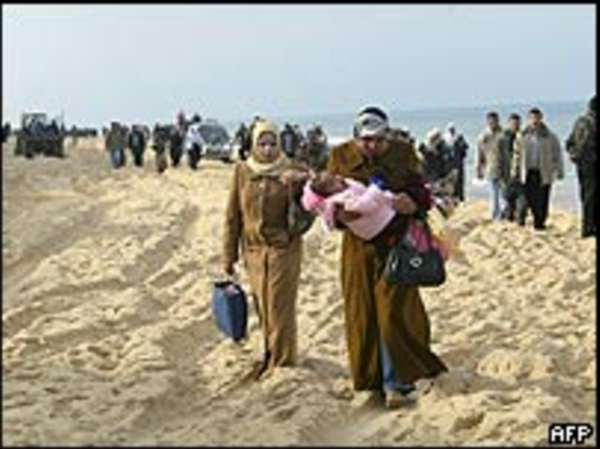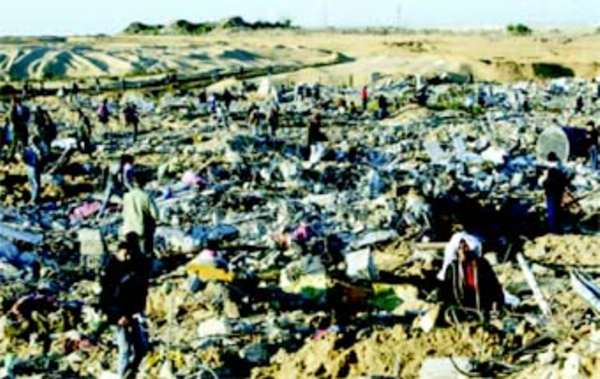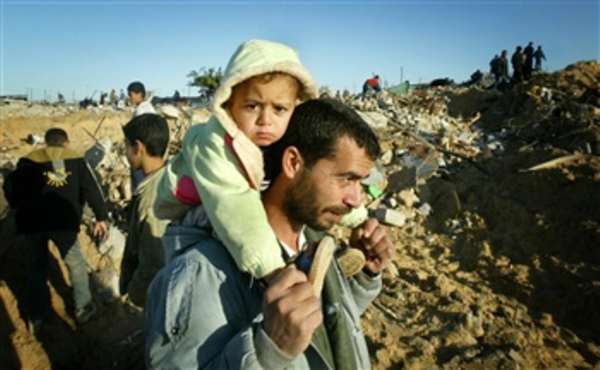
january 2005

Do you want to travel in gaza ? here is your road....
New Invasion of Gaza in Winter "orange iron"
rafahtoday.org
The Israeli
occupation forces made loudspeaker announcements through
the neighborhoods nearest Neve Dakalim saying people must
leave their homes or risk death and injury. Hundreds of
families, roughly 600 men, women and children, had to
flee into the cold into mosques, hospitals, or, in many
cases, on the street further away from the threatened
areas. Despite Gaza's desert location, winters here are  quite cold
and rainy—snow is rare, but wet, cold nights just
above the freezing point are common.
quite cold
and rainy—snow is rare, but wet, cold nights just
above the freezing point are common.
Nobody is being
spared. The tanks have been shooting at ambulances and
injured one ambulance driver, Hasan Abu Samrah, 45.
" The red light of the was clear on the roof of the
ambulance for all the soldiers, but the soldiers intends
to shoot at the ambulance"
"They destroy my leg, my leg was smashed by the soldiers snipers, my leg was smashed while I was trying to get out of home" said a 12 years old boy who was laying down at Nasser hospital.
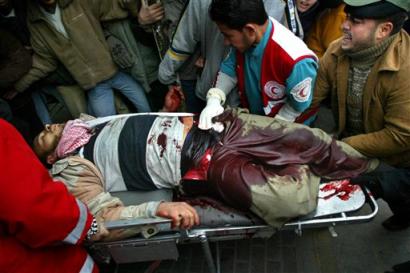
The Israeli soldiers prevent people from burying the
bodies of their relatives whom were killed in Rafah, by
occupying and destroying many parts of Khanyounis
cemetery.
In Khan Younis, four more Palestinians were killed overnight in the Israeli army incursion called Orange Iron.
Khan Younis families stranded and
scattered after weekend's assault
Feature: rafahtoday.org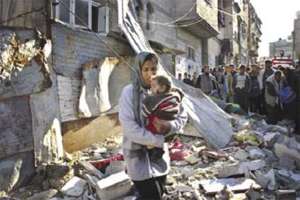
IMEMC Staff, December 20, 2004, 15:43
The Israeli assault on Khan Younis refugee camp in
southern Gaza Friday and Saturday has left hundreds
homeless, searching through the rubble for their
belongings, and trying to set up temporary shelter to
protect them from the cold of winter.
No explanation was given by the Israeli army for the leveling of at least thirty homes, in an assault which left eleven dead and at least 54 wounded (eight critically), mainly by Israeli gunfire. The head of Nasser Hospital in Rafah confirmed that the injured and dead were all unarmed civilians.
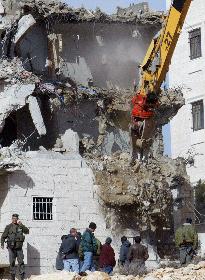 The
Israeli army has asserted that this attack on civilian
neighborhoods is their "response" to homemade
shells fired by Hamas militants at the nearby Israeli
settlement of Naveh Dkalim in which several of the
Israeli colonists were injured.
The
Israeli army has asserted that this attack on civilian
neighborhoods is their "response" to homemade
shells fired by Hamas militants at the nearby Israeli
settlement of Naveh Dkalim in which several of the
Israeli colonists were injured.
So far, Palestinians have been unable to bury the dead because Israeli forces were in control of the local cemetery, medics said.
Several houses in Bait Lahia town in the northern Gaza Strip and the Tal al-Zatar neighborhood were struck by Apache helicopter gunships late on Sunday. In a separate incident, soldiers shelled several homes in Khan Younis, in the southern part of the Gaza Strip, earlier on Sunday, moderately wounding one child. The child, identified as Mohammad Abu Shab, sustained a gunshot injury to his stomach.
Military sources warned that since someone has been firing home made shells toward the Israeli town of Sderot (in the southern Negev), the Army would "require an operation in the northern Strip, as well." Gaza residents note that these attacks are a form of collective punishment, in which whole towns are obliterated for being too close to Israeli settlements.
Residents also fear the expansion of military operations and the destruction of huge areas of Gaza.
The newly
homeless have taken shelter in a United Nations-run
school in Khan Younis. Homeless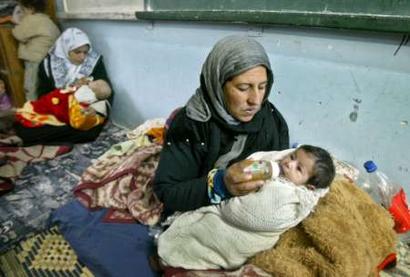 Palestinians
have not received any aid from humanitarian organizations
such as UNRWA and the ICRC, except the $300 handouts
offered by the governorate of Khan Younis (Palestinian
Authority) to each homeless family.
Palestinians
have not received any aid from humanitarian organizations
such as UNRWA and the ICRC, except the $300 handouts
offered by the governorate of Khan Younis (Palestinian
Authority) to each homeless family.
The army, in its
dozens of invasions of Khan Younis – the last, in
October 2004, lasting for seventeen days straight, has
shown an ongoing pattern of demolishing, shelling and
leveling each building which stood in the way of their
tanks. Several children have been killed in their homes
and schools over the past several months, including
Rhagda Adnan Al-Assar, 11, and Rana Syiam, 7, killed just
last week while eating supper at home. 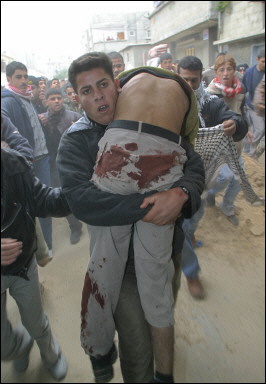
According to the Universal Declaration of Human Rights, children have the right to proper education, treatment and a peaceful life, but in Khan Younis, as in the rest of occupied Palestine, settlements, military camps, bullets and bombs, are daily dangers for children.
Parents raising their children in Gaza dream about a bright future for their kids, sending them to school with hopes for a better life. But the present-day reality is grim -- everyone knows they could be shot at any time, even while they are at home….even while they are sleeping in their beds.
Even though the army has retreated from this particular invasion, it is still there, near the city and its surrounding areas, with military camps and monitoring towers erected in and near every settlement.
Families in Khan
Younis refugee camp – already refugees – have
been displaced again after military bulldozers and shells
destroyed even their refuge, leading residents to wonder
if there is any refuge for them anywhere in this world.
